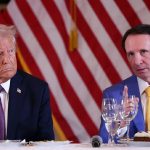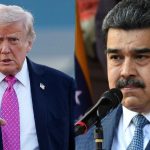We have a hands down winner for Trump’s economic lie of the week. It’s his Japan trade deal. For all you prurient types, I know nothing in economics can compete with Trump’s latest coverup stories about Epstein, but we are narrowing the scope here at Beat the Press.
Anyhow, the big story on Trump’s trade deal was that he lowered the taxes he would charge us on items imported from Japan from 25% to 15%. While Trump seems to believe Japan pays his taxes, they don’t. We do.
This created the bizarre situation where U.S. manufacturers are paying taxes of 50 percent on imported inputs like steel and aluminum, while we can buy a finished Japanese car and pay just a 15 percent tax. It’s not clear how this tax structure is supposed to revitalize U.S. manufacturing, but we’ll leave that one for another day.
The big lie came when Trump told us that Japan’s government is giving him control over a $550 billion fund to invest wherever he likes. And the United States gets 90 percent of the profits.
While news outlets treated this investment fund boast as being plausible, it was a transparent lie. A bit of arithmetic would tell the story.
To start, Japan’s GDP (measured in dollars) is $4.2 trillion. Does anyone really believe the country would hand over more than 13 percent of its GDP to Donald Trump? Can a person who believes this actually write on economics for a major news outlet?
Taking the other side of the equation. Japan sells about $150 billion a year of stuff to the United States. Suppose Trump gets really tough and pushes this to zero. He’ll arrest anyone who buys a Japanese car, television, or computer and send them Alligator Alcatraz.
So now Japan has $150 billion of stuff that it doesn’t know what to do with. It could let the factories shut down, which would create unemployment and be bad news for the larger economy. But people do move to other jobs, even if not overnight. They could sustain demand in the economy with generous unemployment benefits and pay for transitional assistance as well as start-up funds for new businesses.
What’s the price tag on this? Maybe $75 billion in the first year, dropping at the rate of something like 10% annually over a decade. (Yes, these are arbitrary.) That gets us around $400 billion over a decade. Would Japan pay Trump $550 billion to prevent this?
But that is almost certainly the least desirable option. Suppose Japan rushed to find other markets, including its own, by offering big subsidies, which take the form of discounts. Let’s say those are 20 percent.
They could likely replace much of the demand that way. Many people would likely be happy to buy Toyota’s $40,000 SUV for $32,000. Maybe these 20 percent discounts are sufficient to replace two thirds of the U.S. imports. That costs Japan $20 billion.
To avoid substantial hardship, suppose Japan’s government encourages work-sharing. Instead of putting in 40 hours a week, workers can put in 32 hours a week and get roughly the same pay. Other things equal, this should employ 25 percent more workers, likely making up for most of the lost demand.
Let’s say this costs the government another $20 billion a year, putting the tab at $40 billion a year. This expense would again decline fairly rapidly over a decade, let’s say coming to $200 billion. Would Japan pay Trump $550 billion to prevent this?
But let’s factor two other items into consideration. In almost no scenario would Japan’s exports to the U.S. fall to zero. Even a drop of 40 percent would be extreme. That would almost certainly be larger than the impact of Trump’s 25 percent tariffs, especially since he is imposing comparable taxes on imports from everyone else.
That would mean Japan is looking to replace demand for $60 billion of their exports. Cut the above estimates by 60 percent. In the complete shut down story, we’re looking at a cost of $160 billion over a decade. Would Japan pay Trump $550 billion to prevent this?
In the case of government subsidies and work-sharing we are looking at a cost of $80 billion. Would Japan pay Trump $550 billion to prevent this?
These are crude estimates, but they likely give the right order of magnitude. Japan’s government would almost certainly come out far worse financially, in addition to looking like fools to the world, by handing this sort of money to Donald Trump.
But there is one other important factor to consider. A deal with Donald Trump is worthless. Just ask Mexico and Canada about the trade deal they signed with Donald Trump five years ago.
Japan can hand Donald Trump his $550 billion fund and then next year he could still decide that he wanted to double taxes on our imports from the country because he didn’t like something its prime minister had said. Nothing would stop Trump from doing this.
Surely Japan’s government knows that Trump’s commitments mean nothing to him. Any deal they make can be reversed any time Trump feels like it.
For this reason, no serious government would hand Trump a large pot of money in exchange for his promises to stick by a deal. In fact, no serious government would pay any amount of money a commitment from Donald Trump.
source: CEPR




